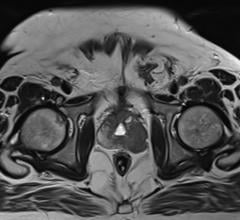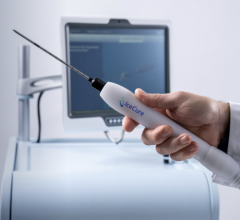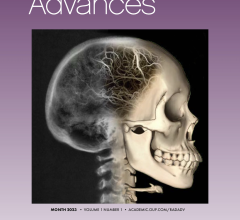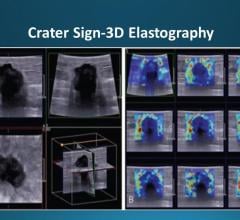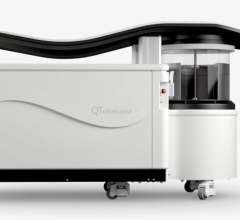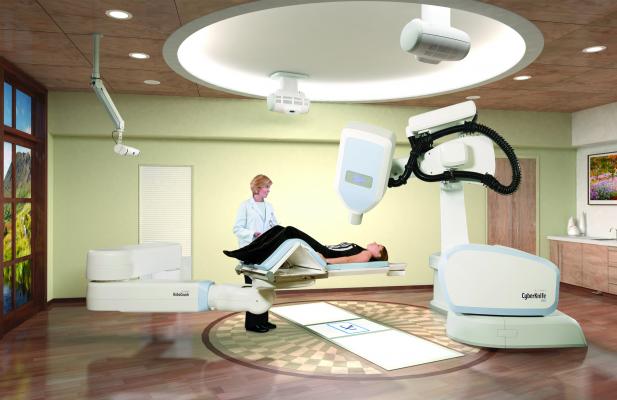
CyberKnife image courtesy of Accuray
November 2, 2015 — Accuray Inc. announced that studies on the clinical use of the CyberKnife and TomoTherapy systems continue to reinforce the devices' broad-based radiation treatment capabilities. More than 80 studies were presented during poster and oral sessions at the 57th Annual American Society for Radiation Oncology (ASTRO) meeting in October. Some of the studies presented show long-term efficacy and safety with median follow-up exceeding five years.
- Data from China and Japan show faster treatment times and efficacy with TomoEDGE Dynamic Jaws
A study compared the plan quality and delivery efficiency of TomoHelical using TomoEDGE dynamic jaws to TomoHelical fixed-jaw delivery mode for nasopharyngeal carcinoma treatments. Results showed equivalent plan quality, with dynamic jaws mode providing a more efficient delivery and better sparing of the optic chiasm, pituitary and parotid glands when compared to fixed-jaw delivery mode. Clinicians affiliated with the Hong Kong Sanatorium & Hospital conducted the study.
An evaluation of stereotactic radiation therapy (SBRT) for brain metastases using TomoHelical in dynamic jaws mode found treatment time was reduced by 75 percent using this modality compared to treatment with fixed-jaw delivery mode, and at 12 months follow-up the local control rate was 100 percent. Research was conducted at five Japanese centers.
- Long-term data (5 plus years) show excellent efficacy with both the CyberKnife and TomoTherapy Systems
Five-year physician-reported toxicity, survival, and relapse-free survival outcomes were reported for patients enrolled in a phase 2 prospective multicenter study evaluating SBRT for organ-confined prostate cancer using the CyberKnife System. The data indicate rates of serious adverse events have been minimal, with intermediate-risk patients experiencing high rates of overall and relapse-free survival. Physician-reported toxicities and relapse-free survival rates compared favorably to other radiation therapy modalities. Seven U.S. hospitals participated in the study, including Swedish Cancer Institute in Seattle, Washington, and Beth Israel Deaconess Medical Center in Boston, Massachusetts.
An additional study of the CyberKnife System for low and intermediate organ-confined prostate cancer showed a high rate of biochemical progression-free survival (95.8 percent and 90 percent for low- and intermediate-risk groups, respectively) with acceptable toxicity at a median follow-up of 84 months. Median prostate specific antigen (PSA) nadir was reached at four years and has remained unchanged for up to eight years, suggesting that the response is durable. Research was conducted at FROS Radiation Oncology and CyberKnife Center.
A study of patients with low, medium, or high-risk prostate cancer demonstrated that hypofractionated radiation therapy delivered using TomoHelical and simultaneous integrated boost (SIB) provides excellent results in terms of both efficacy and toxicity. Patients in all categories treated experienced a high rate of biochemical relapse-free survival and overall survival at five years follow-up, with low rates of acute and late toxicities. Research was conducted at San Raffaele Scientific Institute and Fondazione IRCCS - Istituto Nazionale dei Tumori, Milan, Italy.
- Clinical innovation in breast cancer and total marrow irradiation
A study examined the safety and efficacy of an accelerated dose/fractionation schedule delivered using the CyberKnife System after lumpectomy for selected patients with early-stage breast cancer. With a median follow-up of 27 months, all patients remained locally controlled with good to excellent cosmesis and no evidence of disease following treatment. Research was conducted at Winthrop University Hospital, Mineola, New York.
A phase 1-2 dose-escalation study evaluated the use of TomoHelical for total marrow irradiation (TMI) as the sole conditioning regimen for a second autologous stem cell transplant (ASCT) in recurrent leukemia patients. Full-body conformal radiation of the bone marrow enabled clinicians to successfully deliver a total dose of up to 1,800 cGy to the entire bony skeleton without dose-limiting toxicity. Median overall survival and progression-free survival were 3.8 years and 17.4 months, respectively. Research was conducted at the Ottawa Hospital Cancer Centre and the University of Ottawa, Ottawa, Ontario, Canada.
For more information: www.accuray.com


 April 17, 2024
April 17, 2024 



